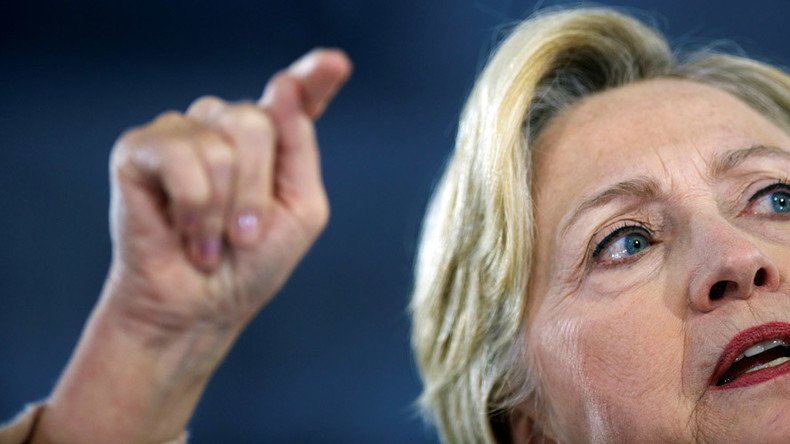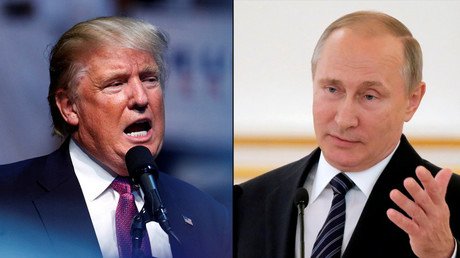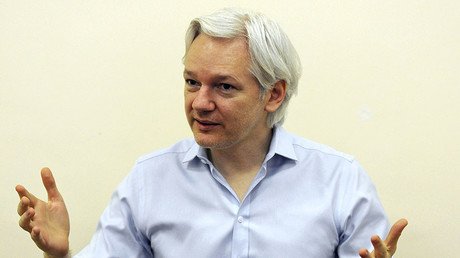McCarthyism of the left? Clinton supporters use anti-Russia rhetoric to bash opponents

They’re not donning poodle skirts or leather jackets, but to many Democrats and liberals, it seems the 1950s never went out of fashion. “Neo-McCarthyism” is how some describe a tactic widely adopted by Clinton supporters affiliating Trump with the Kremlin.
Named after Senator Joe McCarthy of Wisconsin, who held the position from 1947 to 1957, McCarthyism is a term meant to symbolize a personal crusade of guilt by association against political opponents, often in terms of sedition or treason, when there is little or no evidence to support what essentially amounts to a witch hunt. This is a strong picture of what was happening during the height of the Cold War.
McCarthy, a Republican, was long held up by Democrats and others on the political left as the poster boy of right-wing political persecution. In recent memory, in the run-up to and in the early years of the Iraq War, there was justifiably a lot of talk of “new McCarthyism” from backers of President George W. Bush charging progressives with being “anti-military” or sympathetic to terrorists.
In this most bizarre presidential election of the modern era, however, there has been a switch of roles. Now it is mostly Democrats accusing Republican presidential nominee Donald Trump or other adversarial forces of being aligned with the Russian government or specifically its president, Vladimir Putin.
“It's amazing to have watched, in this campaign, Democrats completely resurrect that Cold War McCarthyite kind of rhetoric,” journalist Glenn Greenwald said Wednesday on on the Democracy Now! program hosted by Amy Goodman.
Earlier this week, a letter from Senate Minority Leader Harry Reid (Nevada) to the FBI was published, stating, “I have recently become concerned that the threat of the Russian government tampering in our presidential election is more extensive than widely known and may include the intent to falsify official election results.”
And last month, House Minority Leader Nancy Pelosi (California) reacted to hacks of Democratic National Committee emails, which after being published by Wikileaks resulted in the departure of its top five officers, including Congresswoman Debbie Wasserman Schultz who had been chairwoman.
“I know for sure it is the Russians,” Pelosi said, contradicting top US intelligence officers. “This is an electronic Watergate.”
Not all critics of Trump or Wikileaks are on board with the McCarthyite tactics, however. On Thursday, radio host and lawyer Mike Papantonio spoke with RT’s Ed Schultz, calling the line of attack a “sign of desperation” from the Hillary Clinton presidential campaign.
“To distract issues away from Clinton, to distract issues away from the DNC, we have this full out attack, McCarthy-type attack, on the Russian government,” Papantonio said. “And what their goal is, and if you really take a look at it, they're ignoring the idea that it's inviting a new Cold War that we finally got rid of, we finally passed that. It's in the history books.”
Some in the media are playing this tune as well, without a second thought.
Glenn Greenwald took issue with a New York Times op-ed piece published this week, titled, “How Russia Often Benefits When Julian Assange Reveals the West’s Secrets.”
Tweeting, “Does NYT's partnership with WL to publish huge number of US secrets suggest NYT editors are loyal to Kremlin?” Greenwald referenced the Iraq and Afghanistan War Logs leaked by US Army whistleblower Chelsea Manning.
Does NYT's partnership with WL to publish huge number of US secrets suggest NYT editors are loyal to Kremlin? Questions have been raised.
— Glenn Greenwald (@ggreenwald) September 1, 2016
Greenwald found it ironic, since “it's actually the Clintons who have a lot of ties to Russia as well.”
“I mean, the Clinton Foundation and Bill Clinton helped Russian companies take over uranium industries in various parts of the world,” Greenwald continued, adding, “that he received lots of Russian money for speeches.”
Indeed, former President Clinton received a $500,000 payment from Renaissance Capital, a Russian bank with connections to the Kremlin, after speaking at an event in Moscow. Russian President Vladimir Putin, prime minister at the time, personally thanked Clinton by phone, according to the Wall Street Journal.
Greenwald described the strategy as “very disturbing” and warned of “enduring consequences in the likely event that Hillary Clinton wins, because when you constantly inflame the public by telling them that Russia is this enemy, that they have domestic agents operating in the US, namely anyone who is a critic of the Clinton campaign, that's going to have lots of long-term implications, in terms of how the US government treats Russia.”
The issue of “neo-McCarthyite” attacks has only grown over the summer months. Russia scholar Stephen Cohen made it front and center during an interview on CNN with Michael Smerconish on July 30.
“We're approaching a Cuban missile crisis nuclear confrontation with Russia, both along Russia's borders and possibly over Syria,” Cohen lamented.
“And now, astonishingly, the media is full of what can only be called neo-McCarthyite charges that [Trump's] a Russian agent, that he's a Manchurian candidate, that he's Putin's client,” he said.














